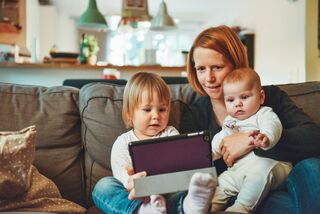Appetite
The Hunger for Solitude During a Lockdown
Some people might be feeling the opposite of lonely when sheltering in place.
Posted April 26, 2020 Reviewed by Lybi Ma
As the coronavirus travels to every corner of the globe and forces millions of us to stay home, researchers are scrambling to launch studies to assess the psychological impacts of this historic moment in time. While it’s still too soon to see published results of these studies, if I asked you to take a wild guess about how people are doing while sheltering in place, you might say, not great?
You’d be partially correct, based on conclusions released by a recent report that speculates how happy (or unhappy) people are during the lockdown currently mandated by most states in the U.S.
The report analyzes data from the 2012-2013 American Time Use Survey (ATUS), which asked participating Americans to keep time diaries where they recorded in detail how they spent their time and who they spent it with. Participants also completed happiness and well-being questionnaires. The report focused specifically on the “who time is spent with” data to simulate the impacts of the lockdown on the average American, focusing on two groups.
Group 1: The Married Couple
If you are married and now working from home, or not working at all, you’re probably spending a lot more time with your spouse. According to the ATUS, people’s happiness levels increase significantly when they spend more time with their spouse (this, of course, is a statistical finding that makes a generalization to all married people but certainly doesn’t apply to every married couple). Thus, the report concludes, married people during the lockdown are probably feeling happier than usual, given that they suddenly have more time to hang out at home together.

Now you might be thinking, Yes, but how long can that happiness last when you’re on day 30 of the lockdown with your significant other?
The study took this into account by modeling a quadratic effect (which acknowledges that not every effect is linear, i.e. going in the same direction for infinity), and they found that although happiness levels would decrease slightly over time, for only 6 percent of people would the effect actually become negative. Overall, that’s good news for those of you who are married, but what about singles who live alone?
Group 2: The Singleton
If you are single, on the other hand, but also now working from home or not working at all, you’re probably spending the vast majority of your time, alone. Data from the ATUS found that for singles, time spent alone had a negative effect on their happiness levels compared to time spent with friends. For example, the average time singles spend with friends is 63 minutes per day, and if all of those minutes are now shifted to being alone, the study concludes that single people during the lockdown are much less happy than they were before. This finding makes sense, especially given that we know that solitude is a positive experience largely when people choose to be alone rather than when they feel forced.
What’s Missing?
There are several limitations to this study, which the researchers themselves concede. Running a simulation is speculative by nature, and the data presented here carry many assumptions. A few examples: single people may have roommates and thus don’t live alone, plenty of couples live together who are not married, and many households are multi-generational. The study doesn’t report on these more nuanced living situations. But there are two more factors that I think need to be considered to more fully understand how the lockdown is affecting happiness.
Children: The X Factor

Curiously, the report doesn’t include any simulations that take into account the time spent with one’s children.
But the reality for many American adults is that they are now sharing almost every waking minute with their kids, whether it be caring for toddlers who are no longer in daycare, helping sixth graders with their distance learning assignments, or cooking for their college students who have taken up residence at home once again. Adults may be juggling this extended parenting time with Zoom conference calls as they try to work from home. We can only guess at their happiness levels.
Hungry for Solitude
Due to the shelter in place orders, we have traded a significant amount of freedom – to socialize, work, travel, and be together– in exchange for another type of freedom: the chance of escaping the coronavirus (or at least of letting someone else be free of the virus by virtue of not transmitting it to them). But in losing these social freedoms, we may be overlooking another loss: that by retreating from the public sphere into our private households – whether filled with children or “just” your significant other – we confront the unexpected consequence of a lack of alone time.
Yes, that’s right. Some of us are stuck at home, longing for solitude.
Freely chosen solitude comes with many benefits, and many of us are feeling the loss of them right now: the quiet needed to concentrate and be productive; the space to pull away and regulate our mood when we’re irritated or overstimulated; time for introspection and reflection; freedom to be creative or simply engage in solitary activities with no interruptions (for a review on the benefits of solitude, see Goossens, 2014 and Larson, 1990).
Many people have their most positive experiences of solitude in nature, running on a forest trail or cloud-watching in a city park, but many of these outdoor spaces are either now closed to the public or overrun with people anxious to get out of their houses. The cumulative effects of such solitude deprivation have not been adequately studied by researchers, but we might assume that, just as social isolation leads to distress for the human social creature, so can lack of quality time spent by ourselves be detrimental to our mental health.
I don’t mean to discount the reality that the shelter in place orders have resulted in a very lonely experience for thousands of people, especially those who live alone – both the young and the elderly – which is concerning, given the research on the negative outcomes of chronic loneliness.

But when the lockdown lifts and we gratefully leave our homes to indulge in long-neglected social gatherings, some of us may also breathe a secret sigh of relief and relish in some long-awaited time, alone.
References
Goossens, L. (2014). Affinity for aloneness in adolescence and preference for solitude in childhood. In R. J. Coplan & J. C. Bowker (Eds.), The handbook of solitude: Psychological perspectives on social isolation, social withdrawal, and being alone (pp. 150–166). Chichester, United Kingdom: Wiley.
Hamermesh, D. S. (2020). Lockdowns, Loneliness, and Life Satisfaction. Institute of Labor Economics, Discussion Paper Series, IZA DP No. 13140.
Hawkley, L. C. & Cacioppo, J. T. (2010). Loneliness matters: A theoretical and empirical review of consequences and mechanisms. Annals of Behavioral Medicine, 40(2), 218-227.
Larson, R. (1990). The solitary side of life: An examination of the time people spend alone from childhood to old age. Developmental Review, 10, 155–183. http://dx.doi.org/10.1016/02732297(90)90008-R
Thomas, V., & Azmitia, M. (2019). Motivation matters: Development and validation of the Motivation for Solitude Scale—Short Form (MSS-SF). Journal of Adolescence, 70, 33– 42. http://dx.doi.org/10.1016/j.adolescence.2018.11.004




